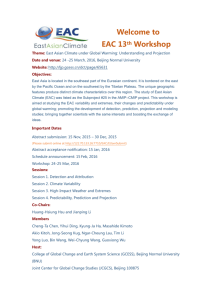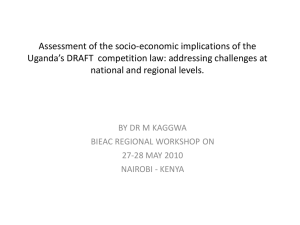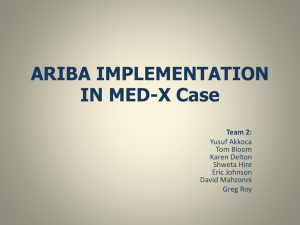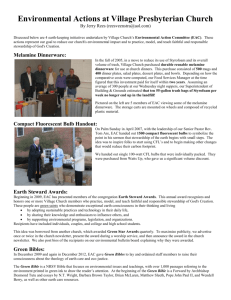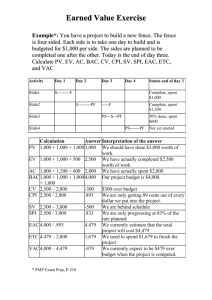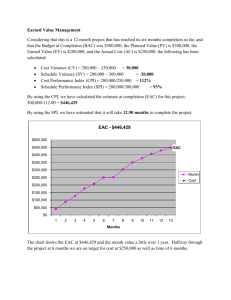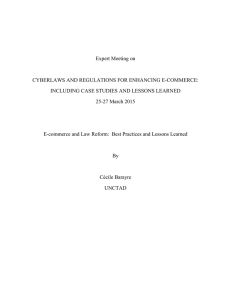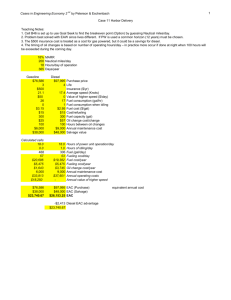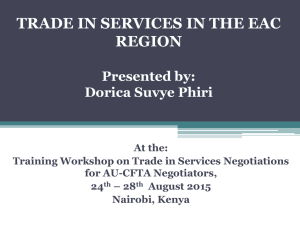REGIONAL MEETING ON PROMOTING SERVICES SECTOR DEVELOPMENT AND TRADE-LED GROWTH... AFRICA
advertisement
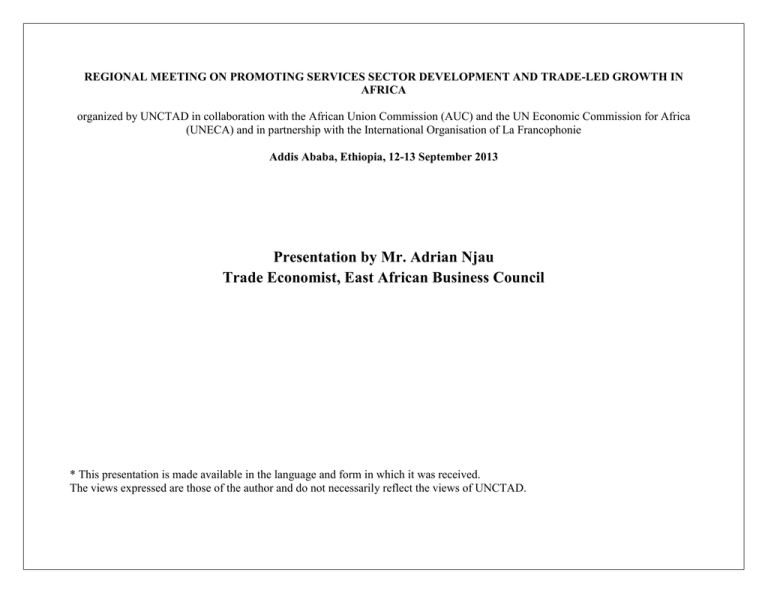
REGIONAL MEETING ON PROMOTING SERVICES SECTOR DEVELOPMENT AND TRADE-LED GROWTH IN AFRICA organized by UNCTAD in collaboration with the African Union Commission (AUC) and the UN Economic Commission for Africa (UNECA) and in partnership with the International Organisation of La Francophonie Addis Ababa, Ethiopia, 12-13 September 2013 Presentation by Mr. Adrian Njau Trade Economist, East African Business Council * This presentation is made available in the language and form in which it was received. The views expressed are those of the author and do not necessarily reflect the views of UNCTAD. Achieving Sustainable Development and Job Creation Through the Services: East African Community (EAC) Experiences Presented during a Regional Meeting on Promoting Services Sector Development and Trade-Led Growth in Africa Presented by: Mr. Adrian Njau, Trade Economist/ILEAP Fellow, EABC 12th September 2013 Presentation Outline: • • • • • • Introduction and background Trends Across Services Sector in EAC Key Transmission Channels of Economic Growth in Services Sectors Contribution of Services Sector to Poverty Reduction Role of Services in Agriculture and Manufacturing Sectors Contribution of Services to Job Creation Introduction EAC is intergovernmental organization of the 5 countries: Kenya, Uganda, Tanzania, Burundi and Rwanda EAC Partner States agreed to ‘establish among themselves Customs Union 1 Jan 2005 Common Market 1 Jul 2010 Monetary Union 2013 Political Federation ? Cooperation in trade liberalization & development – is one of the fundamental pillars of the EAC. Introduction-EAC Common Market EAC Common Market The EAC Common Market Protocol (CMP) provides for free movement of services in the region. Under Article 23 (1), "liberalization shall be progressive and in accordance with the negotiated Schedules of Specific Commitments as provided in Annex V of the Protocol." The first round of service liberalization the EAC Partner States focused on seven core service sectors. These are: communication, business, distribution, education, finance, tourism and transport. The Annex on Mutual Recognition of Academic and Professional Qualifications was adopted. Bilateral MoUs have been concluded by lawyers, medical boards, architects, and accountants in EAC countries. EAC Partner States recognized in their respective national visions and strategies the important role that services play in achieving economic growth and the Millennium Development Goals (MDGs). Trends Across the Services Sector The service sectors share to GDP in Kenya, Rwanda, Tanzania and Uganda is over 50% while in Burundi is 45%. (2007) Value of services exports accounted for over 62% of total exports while the value of services imports accounted for over 16% of the total imports (2007) But key EAC Services Sectors are: Tourism, (Tanzania, Kenya Rwanda and Uganda –main exporter earner) Communications and e-commerce, ( Telecommunication fast growing sector) distribution, business (BOP-growing in major cities i.e Nairobi) , transport (Mombasa and Dar es Salaam hub of Eastern Africa, financial service Kenya investing to other EAC Countries; Energy and maritime transport services, health, ICT (Nairobi) and education services (Kampala) civil engineering and construction, metrology, Service Sector Contribution in GDP in EAC Key Transmission Channels of Economic Growth in Services Sectors For Services to perform properly it demands: Good institutional, regulatory and legal framework at the national and regional level The existence of high-quality infrastructure, stability of the macroeconomic environment & Higher education and training Key transmission channels for Logistic services (transport): Manufacturers Trucks Drivers Importers & exporters Other services sectors: i.e. financial sector, ICT EAC Legal & Regulatory Framework There is need to harmonize/enact national laws affecting trade in Contribution of Services Sector to Poverty Reduction and Welfare Trade in service is income earner on its own right but also an important contributor to trade in goods as has enabling effects of goods, banking, marine services etc. Make basic services more accessible e.g education, health, water, electricity Generate lower prices, improve quality and consumer choice; Main foreign exchange earners for many EAC countries e.g Tourism. The earnings are used to finance health services and education. Support the development of essential input services like transport, education and health services has improve welfare of East Africans Role of Services in Agriculture and Manufacturing Sectors As the services contribution to GDP surpass agriculture and manufacturing its role as inputs into the agriculture and manufacturing sectors has increased tremendously. Services plays an infrastructural role to the other sectors i.e Agriculture and Manufacturing. i.e. Transportation of agricultural inputs (fertilizers) and produces from farm to the market. Transport of raw materials, final goods for manufacturers. Services infrastructure provides vital inputs to production and marketing of goods : Financial services, transport, energy, play key role to agriculture and manufacturing. Enhance competitiveness of both agriculture and manufacturing. Financial sector: credit access to farmers, Contribution of Services to Job Creation The service sector is an important sector in providing employment in various EAC Partner States. In Kenya for example, the sector accounts for about 10% of total wage employment while it is still the same sector (particularly the retail trade sector) which is leading in generation of new jobs. In Tanzania, the sector accounts for about 16% of the total employment in the country. Skill sets required: Information Communication and Technology (ICT): This required to all sectors i.e Logistic; Professional services , Telecommunication etc. THANK YOU AKSANTENI SANA East African Business Council Olorien House, Arusha Tel: +255 27 2543047 Email: info@eabc-online.com Website: www.eabc.info EABC – The Voice of the Private Sector in East
